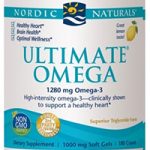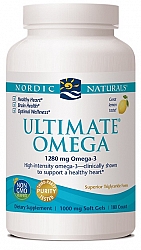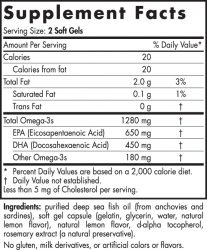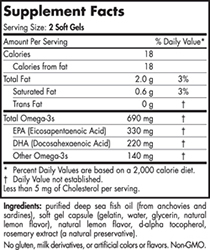 Omega-3 is one of the best supplements you can take for your health. In fact over 28,000 studies have been published about the role they play in our health. The top health benefits of taking omega-3 are for your heart, brain, and eyes. In addition science suggests that these essential fatty acids may help with inflamed joints and diabetes. Not all omega-3 sources are the same. The number one thing about fish oil is quality. Most people associate omega-3 oils with a fishy taste. But today, technology has allowed manufacturers to eliminate that unpleasant taste. Today it is possible to buy products that have a citrus taste and some even have a chocolate flavor.
Omega-3 is one of the best supplements you can take for your health. In fact over 28,000 studies have been published about the role they play in our health. The top health benefits of taking omega-3 are for your heart, brain, and eyes. In addition science suggests that these essential fatty acids may help with inflamed joints and diabetes. Not all omega-3 sources are the same. The number one thing about fish oil is quality. Most people associate omega-3 oils with a fishy taste. But today, technology has allowed manufacturers to eliminate that unpleasant taste. Today it is possible to buy products that have a citrus taste and some even have a chocolate flavor.
Omega-3 – What are they
The most important part of any omega-3 product is EPA and DHA content. In addition there should be third-party certification.
- DHA (Docosahexaenoic acid) is an unsaturated fat, found in fatty fish. It is the key component of our brain, nervous system, and eyes. This is the most abundant omega-3 in our brain. We need to constantly replenish this omega-3 for optimal brain health. This type of omega-3 is critical for vision, heart, and cognitive health.
- EPA (Eicoasapentaenoic acid) is also an unsaturated fat which produces compounds that fight inflammation. This is the component that helps to maintain normal triglyceride levels. The average American consumes only 113 mg/day of EPA and DHA.
- EPA and DHA can be converted by some plant sources of Omega-3 known as ALA (Alpha-linolenic acid). The most common plant sources are flaxseed and chia seed. The omega-3 oils in flaxseed oil are the highest compared to other plant sources. This is great for vegetarians however males should be concerned with the high levels of estrogen in flaxseed. This is especially true in the 50 plus year old male due to its ability to reduce testosterone levels. Another issue of getting omega-3 (ALA) from plant sources is that the body does a poor job of converting ALA into EPA and DHA. The American Journal of Clinical Nutrition reports that less than 10 percent of ALA is converted into EPA and less than five percent is converted into DHA.
- Third party certification would be mercury free endorsements like the one from the American Pregnancy Association.
Some consumers think of a fishy taste when then think of Omega-3 products. One of the best ways to reduce that taste is choose a fish oil supplement that is flavored. Once of the most common flavors would be citrus or lemon. Also chill you Omega-3 product. Flavors are reduced when chilled and this can be an option that most do not consider. With all the health benefits of Omega-3’s the flavor is no longer a good reason to shy away from these products.
Omega-3 – What they do
Essential fatty acids or omega 3’s are the most studied nutrients compared to all other supplements. The health benefits range from reducing inflammation to diabetes. However the most studied health benefits include heart health, brain health, and eye health.
Heart
- Studies show that omega 3 essential fatty acids can support normal healthy triglyceride levels and healthy blood pressure levels. Extensive clinical data supports the American Heart Association’s recommendation that fish oil has long-term heart health benefits. Both benefit and safety have been confirmed for consumers who take omega 3 for heart health.
Brain
- Since our brains contain the largest amount of omega 3 in our bodies it only makes sense that it would benefit from supplementation. Studies suggest that the neurotransmitters responsible for keeping us happy benefit. These are known as dopamine and serotonin. When we supplement our brain with a regular dose of omega 3s studies suggest that adults experience increased brain functioning and cognitive performance. This is especially true as we age.
Eyes
- Omega 3s are very important to both development and maintaining a healthy vision. The retina of the eyes contain the highest concentration of DHA in our body. Macular degeneration and dry eye syndrome are common in the aging process. Omega 3 supplementation may protect against these common adult problems. Omega 3’s also support proper drainage of intraocular fluid from the eye, decreasing the risk of high eye pressure and glaucoma.
Should Omega 3 supplementation should be a part of your daily regimen? Ask your doctor. Most physicians will agree that every adult can benefit from taking Omega 3 essential fatty acids.
The following fish oils are mercury free and endorsed by the American Pregnancy association as safe.
or to purchase.

 Click on
Click on 


Leave a Reply
You must be logged in to post a comment.